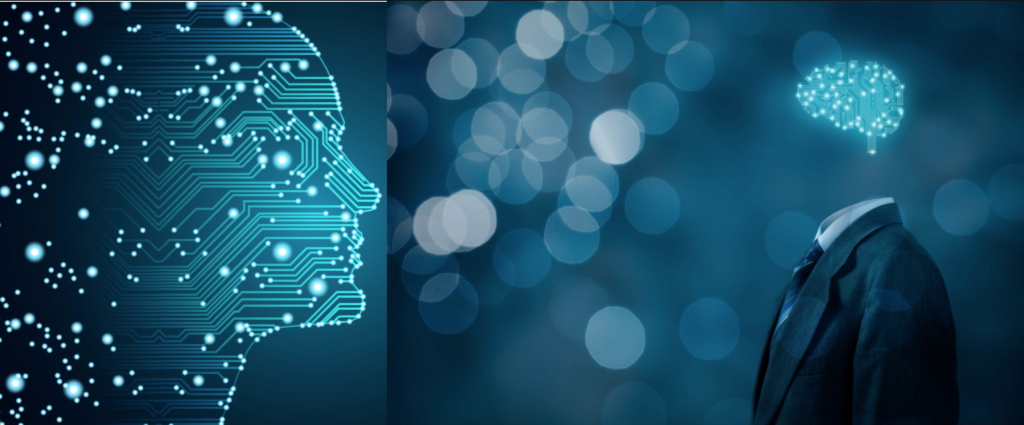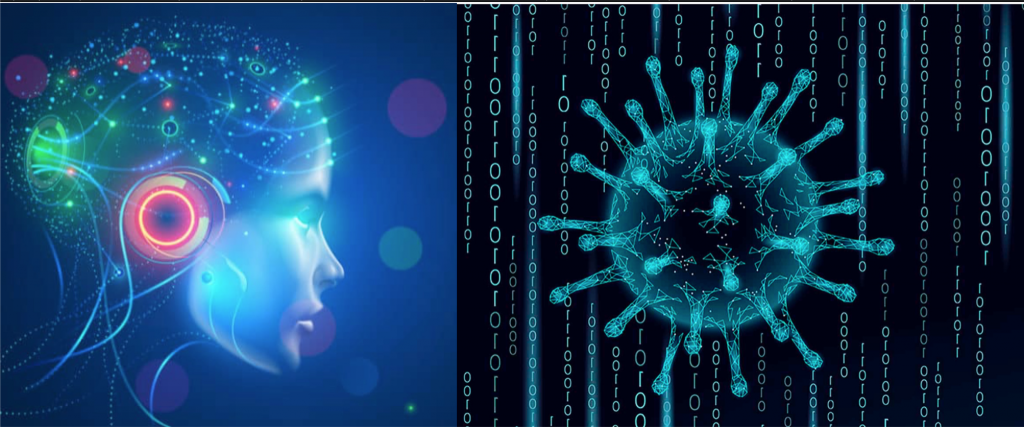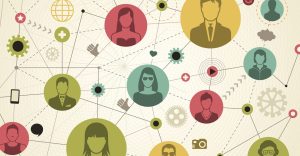
Fundamentally, the government and public servants, i.e. policymakers make innumerable decisions every day. These decisions do have an impact on people’s lives ranging from minor to life-changing. Policymakers have a huge responsibility to ensure transparency, accountability and recourse to appeal that is appropriate to the impact of the decision. Hence, policymakers have an important role in the creation of laws, tending to the needs of the society. Nowadays, the disadvantage of the current system with policymakers is that there exists bias with for example making decisions which have direct impact on society.
Over time there have been developments regarding the exchange of information and service electronically with the society and businesses, this is called E-government.
Another new development within this area is Artificial intelligence (AI). Artificial intelligence can be applied in machines or computers to learn from experience. It adapts itself with new inputs to eventually perform human-like tasks, such as decision-making, thinking and acting rationally. Technologies within the area of AI, i.e. machine learning, deep learning or natural language processing, can help computers or machines to perform such human-like tasks by using data and recognizing patterns in data.
Artificial intelligence assures to change how government agencies do their work. There are already governments that have used AI to manage for example: budgets, detect fraud, predict and limit energy consumption. Hence, this is a reason why AI has the potential to reduce the cost of governance functions and help out policymakers in decision-making. Thus, using AI can help make policy-makers’ performance more efficient and effective.
“Suddenly, the risk of doing nothing feels much greater than the risk of introducing new technology and processes.”
During the COVID-19 pandemic the US Department of Health and Human Services is applying AI to analyze data to make internal operations more efficient and responsive to people’s needs. AI helps to answer questions like: is there enough medical personnel, hospital beds and how about supplies (like food and medical related supplies). The AI technologies that have been used so far during the pandemic have shown to help policymakers to mobilize personnel, supplies and other equipment. This also results in time saving for the policymakers.

Thus far, it is important that the government or policymakers recognize that AI has the potential to achieve almost every aspect of government. If the current government and policymakers will embrace and recognize this potential in AI, they can arrange a better economy and a healthier society that is equal and transparent.
In the next chapter will be explained how AI can replace or support certain tasks from policymakers, with a consideration between AI systems and the policymakers. Pros and cons will be discussed and how it can be an ethical dilemma in the society.
Why we should..
Automation has been seen for a long time as the only means to significantly advance the standard of living. Partly automating the policy making process has plenty of advantages.
Selfless and fair
We don’t have to point out that history is full examples of political corruption and blackmailing scandals all over the world. Intelligent machines can be built with completely no self-interest. A completely selfless policy maker could take a fair middle ground and thus create better policies. These policies are less extreme which leads to a less extreme polarization of our society. Policies based on a fair middle ground tend to offer more fair opportunities to its citizens which positively impacts the economy and a better distribution of wealth (lowering poverty).
Data driven
Intelligent systems are, in contrast to humans, data driven. That means that these machines only take into account the facts it’s presented and are not swayed by emotion or approval ratings when making policies. A well built machine works bias free, which is for humans close to impossible to do. Bias in machines are a well-known problem within the AI field. It is currently also really hard to create a machine completely without bias, however there are many researchers exploring this problem. Combined, a bias free and fact driven machine could create policies more fair and just than human policymakers.
More consistent
One other benefit of machine made policies is that the policies better fit or complement each other. For example in democratic countries multiple political parties negotiate, compromise or trade with their policies. This results in a nation where multiple parties create a mixture of policies based on their interests. This mixture of policies might not be optimal. When a machine is in charge of suggesting policies (based on a deeper analysis on both successful and failed previous policies), these policies would tend to fit better together than human engineered policies. This would result in more but less complex policies with less loopholes and overlap.
Combining subhuman speed and availability
Specialized machines tend to outperform humans in terms of speed. Even if the human is smarter than a machine, machines could just brute force their way to the solution first. A nice feature, but speed is not really high on the list of priorities of policy makers. Policy makers rather release a complete and fair policy into the world than multiple rushed policies. That being said, decreasing the delays (bureaucratic) government and in general speeding up policy making processes would be very desirable. Removing unnecessary delays would allow policy makers to spend their time better, e.g. adjusting their policies based on responses. Automation has massively contributed to the shorter workweek of modern humans. In the case of policy makers, this would not though. In fact the opposite. Institutional automation allows machines to work around the clock. These machines take no holidays or sick days and by using a decentral system, these machines would have literally zero down time. It’s nice to have these systems always available, but why would we want to have these machines operate 24/7? Well, you could see it as some sort of guardian angel. On a high level always monitoring policies and their effect on the world. A fast and always available artificial policy maker could quickly suggest or even invoke economy saving micromanaging policies. See a trend in international cyber-attacks? Temporally create 500 grants for cyber security education. Predicting a natural disaster next week? Halt or decrease investing in buildings for a week. Having a system do this level of micromanaging through policies allows governments to better their utilization of resources and its citizens.
Lower cost
One other general advantage of automatization is the decrease in operational costs. Sure, building a decentral system together with research & development could be expensive, but like most government projects it will make up for it in the long run. Imagine the system replacing the vast majority involved in policy making and saving on all their: salaries, housing and building costs, training costs, insurances, benefit packages, general utilities, equipment and supplies cost. Even considering the creation of new jobs, this could save millions! However, this general money saving rule mostly applies to the private sector as governments always find new ways to waste money. How the governments should and shouldn’t spend their money is a bit out of scope for this article, but it ultimately ties back to the policies it made.
International adversarial view
If for whatever reason these arguments didn’t convince you, consider an international view on this topic. We all know now that humans can’t compete against automation. What would happen if adversarial nations innovate while we stay behind? Their intelligent systems could help them ruin everything we hold dear, our position on international trade, the labor market, our economy, you name it. What if they gain a strategic advantage by using their systems to analyze 100 times more steps ahead compared to what we could do? Let’s at least innovate so we don’t be left to the mercy of adversarial nations.
Considerations
“That sounds amazing right?” Well, it’s easier said than done, automating any human intensive process is currently a hard challenge. Automating this process could introduce some new risks to the future of policy making. As earlier mentioned there are some considerations regarding the costs and research and development. Besides these points there are a couple more that we like to mention. We are kind of taking the creative aspect out of the policy making process, this would not be a bad thing but should be noticed. A counter argument of human creativity is that machines can systematically explore all possible solutions, these machines could intelligently search or even brute force for an acceptable policy. Humans can get bribed and blackmailed, machines are even worse off: they could be hacked. Cyber security plays a huge risk in all our lives, especially against governments. Abiding to an open and decentral system design would discourage a lot of hackers from messing with these systems. When one system gets taken down, two more can take its place. Or when one machine sends compromised policies the majority of machines can vote the hacked machine out of the decision making process. The last danger of automating a highly critical government process would be the use of immature technology. We don’t know yet what the limits of these machines are. High level government jobs were predicted to be one of the last jobs to be automated. We argue that we as a society should be eager to research and explore this topic, but treat it extremely careful with implementing this.
Is government by algorithm attainable?
Currently, we are still in the earliest stages of the commonly called algorithmic regulation. With algorithmic regulation is meant, AI regulates human behaviour and enforces laws. Nowadays with the political upheaval in the society, AI advocates claim that algorithmic regulation could be a solution to improve human-created laws and regulations. The advocates even claim that there can exist a world where AI could autonomously create legislation, anticipating and preventing social problems before they even occur.
However, there are some concerns related to algorithmic regulation. The AI system can be vulnerable against hackers, it is not with certainty that this system will be hacker proof. Even a bigger concern when the system will have security breach, is that algorithms tend to be ‘black boxed’, this means that it will be unclear what exactly is being changed by the hackers. Overall it is very hard for hackers to breach a well protected intelligent system, for example the neural network in a self-driving car of the company called Tesla is well protected with the method known as “Gradient masking”. Still, neural networks are not completely hackerproof which is something that lots of software-engineers are nowadays working on.
From an ethical perspective, it remains a common question if it is important that the society understand such algorithms that will be deployed while supporting certain tasks. At least it is important that there is transparency within the algorithms, since the human decision process is not always transparent. An intelligent machine could be designed in such a way that it could be audited by 3th parties. Ideally the algorithm that produces policies should be open.
Overall, at the moment it is hard to say if it is possible to completely replace our policymakers by AI driven computers. However, replacing or supporting particular government tasks is possible and even improves the current system, this has already been proved in various applications. An example of an application is mentioned in the Introduction part of this paper.
So in general by employing AI, it will have a lot of positive impact on society and improvement on certain areas within the government. To make fully and correctly use the potential of AI, it is important that the society and policymakers debate about what the desired outcome should be from the deployment of algorithms, in such a way that we can understand and agree exactly what we want as a society.
Conclusion
Taking in account both pros as cons, it is possible to achieve a society with a combined government existing of both policymakers and an AI system which is based on algorithmic regulation. Various experiments implemented by the government with AI performing human-like tasks and decision-making have been successful so far. These experiments with AI seem to improve current tasks of policymakers, particular tasks are being performed more efficiently and effectively. So combining the forces of both the policy makers and AI algorithms will result in better outcomes for the society in multiple ways, like decision making, enforcing laws and creating a more prosperous economy. With this said, it is important to take into account that algorithmic regulation is still in the early stages, but definitely promising and has a lot of potential to achieve even more in certain areas within the government and a possibility to replace or support particular tasks.

